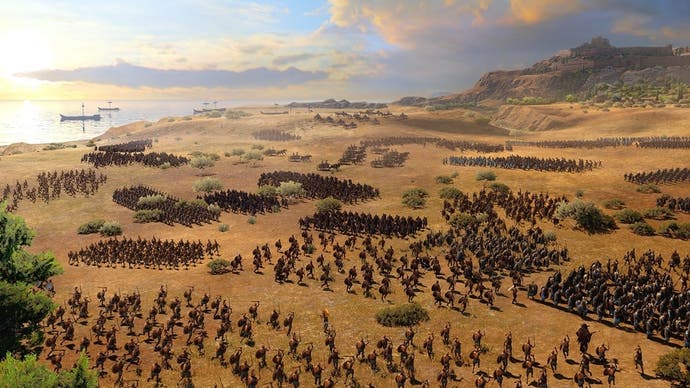A Total War Saga: Troy review - Creative Assembly tackles the classics
Troy a little tenderness.
After the colourful characters and political machinations of Total War: Three Kingdoms, Troy: A Total War Saga initially feels like a step backward. A thousand-year step backward, to be precise. Troy might sound like an awesome setting for a Total War game - the Iliad is the font from which all other war stories drink, after all. But the deeper into time Total War delves, the less it has to work with, and fielding armies of clubmen and slingers on the precipice of history doesn't exactly make for the most thrilling military encounters.
Then I recruited my first minotaur, and that changed things. It wasn't simply the fact he could smash through a unit of spearmen like a cannonball through a cake. It was the way Troy presented him. See, Troy's Minotaur isn't the one Theseus encountered in the Labyrinth - half-man, half-bull, perpetually lost. Instead he's simply a big dude with a big axe who has a penchant for bovine millinery.
Troy offers us the first mythic Total War, but does so with an eye that's less poetic and more forensic, trying to figure out the possible fact behind the obvious fiction. Hence, your army may have spearmen fighting alongside centaurs, slingers lined up beside harpies. But the harpies are presented as fleet-footed, spear-throwing women who decorate their battle-dress with feathers, while your centaurs are painted tribesmen who excel at fighting on horseback.
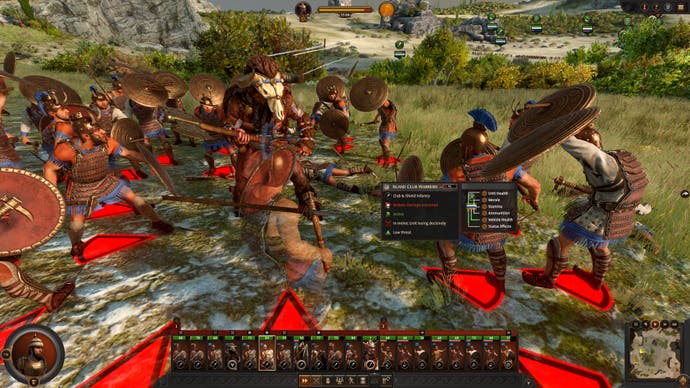
These legendary units are exceptional warriors, but ultimately human ones. It's this unusual, nuanced perspective that elevates Troy from being another, smaller Total War game. Much like Three Kingdoms, Troy delves deeply into the themes of its pseudo-history. The characters, the creatures, and the conventions of the Iliad and wider Greek myth. It isn't quite as successful, but the resulting systems are nonetheless fascinating to grapple with.
This approach begins with the strong personalities who become the drivers of Troy's conflict. For the campaign, you can choose from several leaders on both sides of the war, each of whom has a distinct play-style moulded around their character. Play as the legendary warrior Achilles, for example, and your campaign will be driven by rollercoaster emotions and a lust for glory. Winning battles and performing great feats as Achilles means cheaper armies and more political influence. But Achilles is also a right moody git, and his volatile temperament makes him an unreliable statesman, his economy and military strength swinging with his moods.
Meanwhile, King Agamemnon's campaign is all about power politics. Agamemnon's favourite trick is to make vassals of his enemies and then drain resources from them in the form of tribute, while the heroes of his armies double as court politicians, conferring bonuses onto his faction when emplaced. One of the most interesting heroes, strangely enough, is the man responsible for the whole war, Paris. Lover boy fights best when close to Helen. Acting essentially as a portable upgrade, Helen provides stat boosts to Paris' army and any city she resides in. But Helen can also be captured by enemy states, which puts Paris in a massive sulk, impacting his whole faction.
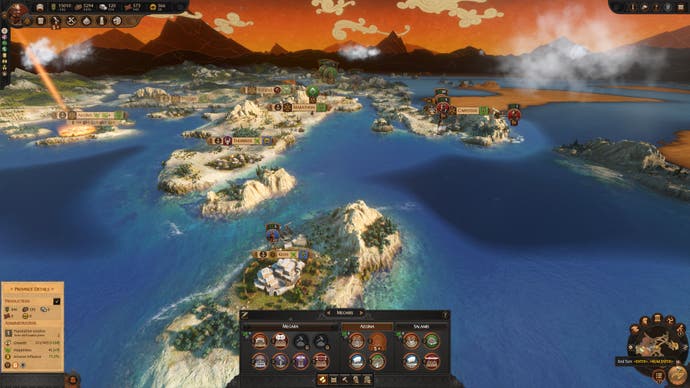
Whichever character you decide to play as, the ultimate goal remains the same, to either capture or defend Troy. To do either of these, you first must bring your half of the ancient world into line, capturing or allying with other Greek or Trojan city states, amassing enough power to launch ships across the Aegean and bring your enemies to heel.
While the broader strokes of fighting battles and building cities will be familiar to veteran Total War players, there are several areas of the campaign where Troy makes key changes. Resources and trading have both been reworked to better reflect the economics of Troy's proto-historical world. There are five resources in total - food, wood, stone, bronze and gold. These are produced by the outlier settlements that surround main cities, each of which will specialise in one resource.
Ideally, you want to control enough of each settlement to see a healthy influx of each resource. But the distribution of settlements makes achieving this difficult. It's more likely you'll have an abundance of one resource and a shortage of another. Fortunately, you can barter resources with other factions, giving them your excess wood for their excess food.
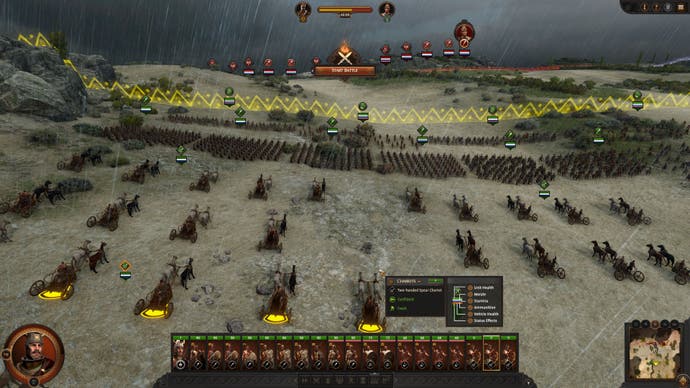
Compared to the more abstract trade routes seen in Three Kingdoms, there's a pleasing clarity to Troy's system, and I used it more than any other Total War game. There is a downside to Troy's emphasis on haggling though, which is that other factions pester you constantly with trade deals that are absurdly weighted in their favour. Not only is this annoying, it's so incessant that eventually you stop paying attention to the AI's wheedling. One time I accidentally gave 10,000 food to a rival in exchange for military access I didn't need, because I'd mentally checked out of the AI's turn.
Religion, too, plays a major role in Troy. Building altars and temples to a specific god will increase your standing with that god's cult. At lower levels, this provides minor stat bonuses, at higher levels, the ability to recruit legendary units such as the Minotaur (cheers Zeus!). As such, dedicating yourself to a particular cult is a good way to unlock powerful units in the early game. In true Greek style, however, the gods are fickle bastards, and will just as soon send a flood to ruin your crops as bless you with free goodies.
There is another way to gain access to mythical units, which is to conquer a settlement capable of producing them. Combined with the unique resources settlements produce, this adds considerable complexity to choosing your next strategic target in the game's first half. Do you head for Euboea, where giants roam, or explore the Cyclades in search of Sirens and Harpies? Maybe you should do neither, instead focussing on sourcing some extra bronze so you can better support the units you can already recruit.
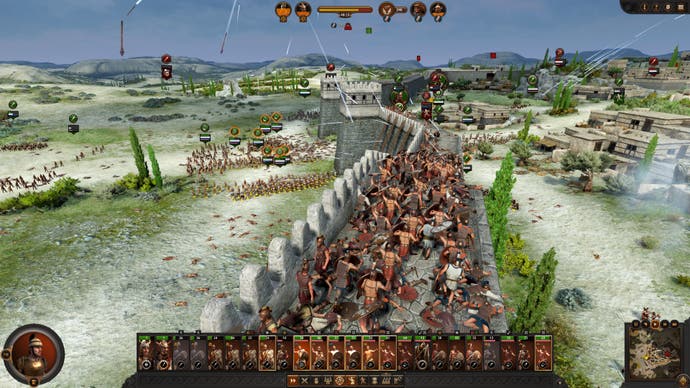
On the battlefield itself, Troy starts out slow but improves as it goes. The most technologically advanced object you'll see is a chariot (which are admittedly awesome at tearing up armies from the rear). Unless you play as Pythia, cavalry is a rare sight. Sieges are a straightforward case of scaling the walls or battering down the gates, assuming the settlement has walls to start with. Even the weather offers little in the way of variety. Most of the battles I fought took place in glorious Aegean sunlight, which makes the game look beautiful, but isn't very interesting from a tactical perspective.
That said, the rugged topography of Greece and Anatolia makes for fantastic battle maps. All the crags and escarpments and rocky pillars create an abundance of bottlenecks, natural fortifications, and dramatic elevation levels you can take advantage of. Meanwhile, the semi-mythical units compensate for the lack of technological diversity. Not only do they create much-needed spectacle, they also add multiple layers to the game's largely infantry-based combat. For example, units have different weight measurements, with lighter units like javelin-throwers being able to move faster, while heavier units are useful for breaking lines when they charge.
If there's one area where Troy falls short, it's in the relationships between its characters and factions. Despite the strong personalities of its playable faction leaders, Troy fails to conjure the emotion at the heart of the Iliad's war. The vengeful rivalry between Achilles and Hector, Menelaus' hatred of Paris, everyone's general disdain for the power-hungry Agamemnon. The Trojan war is an ideal setting for the personal politics Three Kingdoms explored so well. But those systems are absent from Troy. Alliances, meanwhile, are a crucial element of Troy's play, but beyond the new trading system, diplomacy is one of the most undercooked areas of the game. You don't get a sense of camaraderie between your Greek or Trojan allies. It's all very staid and functional, and that's a shame.
I remain unsure if Creative Assembly is making the most of these "Saga" games as opportunities to experiment. I'd be happy for them to be smaller, wilder experiences rather than trying to match the grandeur of the mainline games. Still, there is undoubtedly improvement here over the unremarkable Thrones of Britannia. Troy may not be as impassioned and hot-blooded as the characters it represents, but its distinctive factions, thematic systems and nuanced interpretation of myth nonetheless succeed in firing the imagination.
